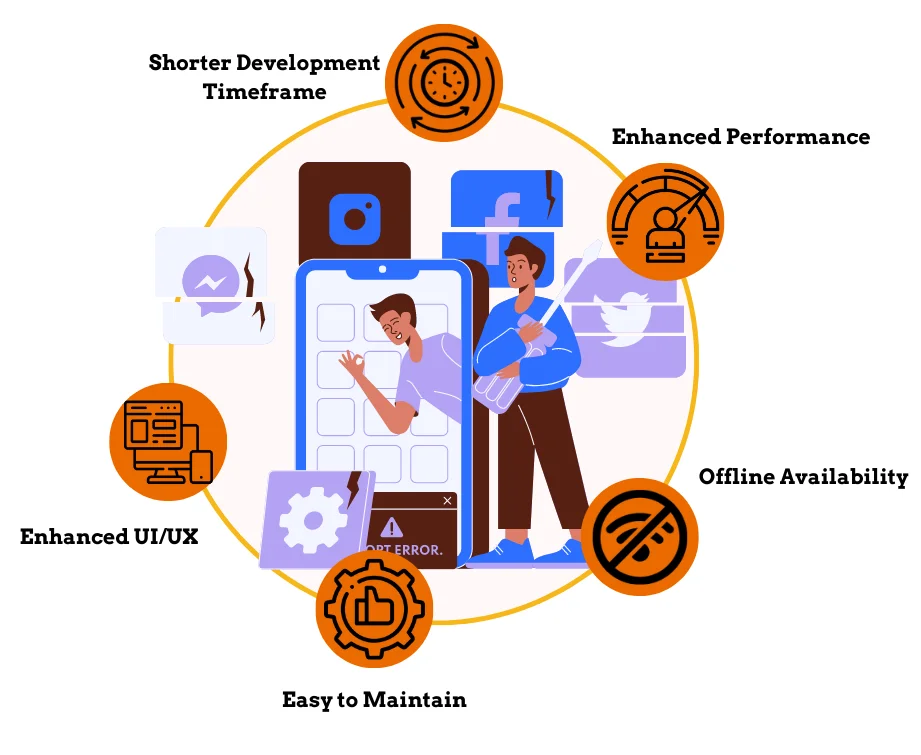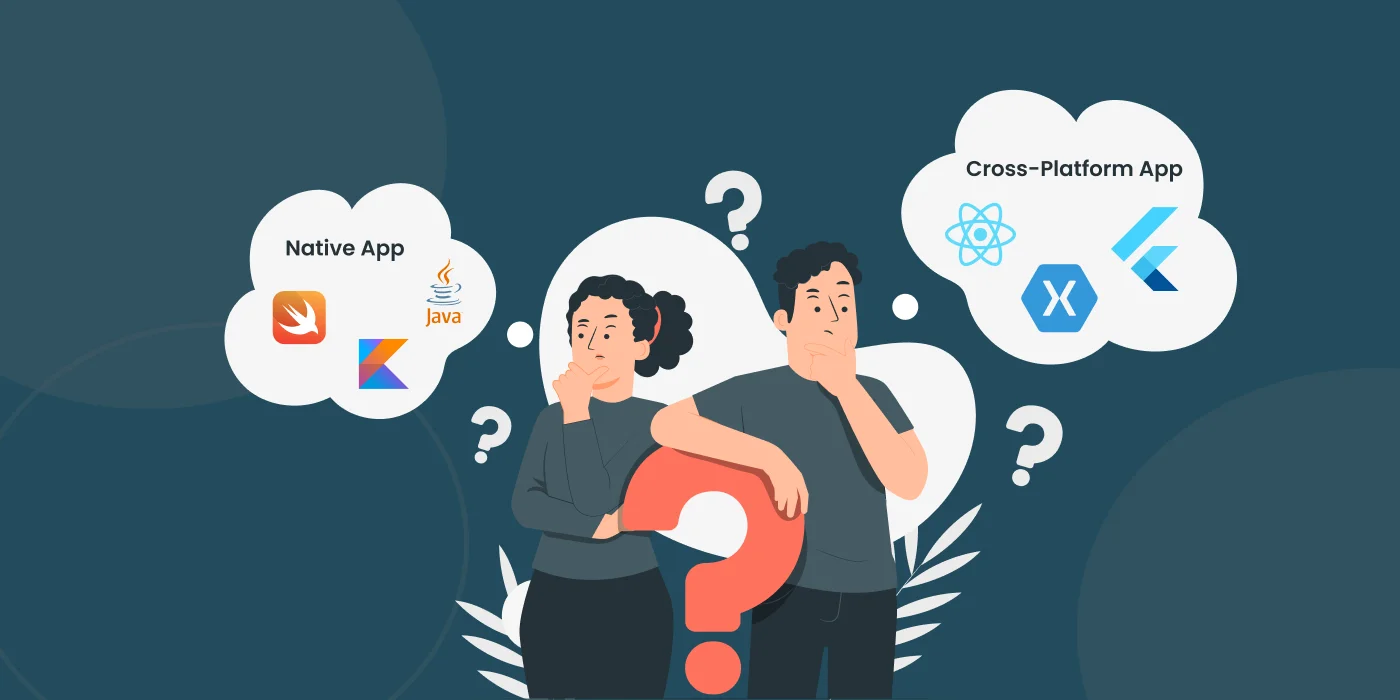The mobile application development industry is very vast, more than 90 thousand apps are launched each year and the probability for an app to get famous is one out of hundred. It is because the future of any app depends on the type of platform it is created on.
The constant debate between Native v/s Cross-Platform Mobile App goes on and on. There are many factors like the cost of development, time, etc. that are involved before choosing the right platform and ensuring that it is in alignment with your company’s goals is necessary.
There are two major ways of developing mobile applications: Native and Cross-Platform development. The former is created to target any specific operating system while the latter is created to target multiple operating systems.
Native Mobile App Development
Native development is a process of developing an application for any specific operating system, either iOS or Android. Depending on the operating system you are developing an application for, different programming languages will be used; like for Android Java or Kotlin, or for iOS Objective C or Swift will be used. In Android, Java was limited to only object-oriented programming, but Kotlin supported object-oriented as well as functional programming. Objective-C is the first ever language used to write iOS software codes. During their Worldwide Developer Conference in 2014 Apple introduced Swift. They also claimed that Swift is 2.6 times faster than Objective-C.
Gearing Up The Tools
Native Mobile Applications does not only require OS-specific software development kits (SDKs), but also integrated development environment (IDE). The Android Tools can work on Windows, macOS, or Linux while the iOS tools can work only on macOS.
Android:
- Android Studio
- IntelliJ IDEA
iOS:
- XCode
- AppCode
Pros and Cons
| PROS | Cons |
|---|---|
| Performance: By leveraging the core programming language and APIs, the apps become very fast and responsive. | Development Costs and Time: Because of the requirement of creating applications for different OS with different codebase, both time and costs increase. |
| User Experience: By following platform’s design guidelines and standards, native apps provide a seamless user experience. | Maintenance: Maintaining and updating the codebases becomes hard and time consuming, especially during the introduction of new features. |
| Security: Because of platform-specific built-in security features, native apps enhance security of user’s data. | Error in Coding: Since the codebase increases, the probability of errors and bugs increases. |
Things To Keep In Mind
It is not easy for the pocket to create a native app. The requirement of developers and costs are high and not everyone can afford that. Before developing a native mobile application ensure who is your target audience and for which platform you need to create the application for. The app to be developed should be easy-to-use at the same time aesthetically pleasing. In this fast-paced industry, people look for faster and convenient apps. If you gain insights and feedback from one platform and use it for future development, it will help in better UX.
When to consider investing in a native mobile app development?

Cross-Platform Mobile App Development
Cross-Platform Mobile App Development is a process of developing an application for multiple operating systems with a single codebase. Different mobile phones can use cross-platform applications at once as it is a universal solution and is supported by every OS. Tools like React Native, Flutter and .NET MAUI, formerly known as Xamarin, are used to create applications which can be used for both iOS and Android. Unlike Native Applications, Cross-platform mobile application framework uses platform specific SDKs from a unified API. These cross-platform frameworks use JavaScript, Dart, C# and XAML as programming languages and to make the application feel more native, it is composed of native UI elements.
Examples of Cross-Platform Mobile Applications:
- React Native: Instagram, Skype
- Flutter: Google Ads, The New York Times
- .NET MAUI/Xamarin: Alaska Airlines, APX
Gearing Up The Tools
Just like Native mobile App Development, Cross-Platform Development also needs OS-specific SDKs. For deploying an Android app, you will need an Android SDK along with Windows Linux or iOS device and for iOS, you need an iOS SDK, Xcode and specifically an iOS device.
List of some IDEs that support the cross-platform mobile frameworks:
- React Native: VS Code, Xcode, Android Studio, WebStorm, Atom
- Flutter: VS Code, Android Studio, and IntelliJ
- .NET MAUI/Xamarin: Visual Studio, Rider
Pros and Cons
| PROS | CONS |
|---|---|
| Low Costs and Time Saving: With no need to rewrite the code for two different OS, Cross-platform development saves both time and money. | Low Performance: In comparison to native apps, the performance of cross-platform applications is low. |
| Code Reusability: The same code can be used for a wide range of phones with different operating systems. | Poor UI/UX: Even after adding native UI enhancements, certain designs will be foreign to the OS. |
| Easy Maintenance: It becomes easy to maintain and update applications due to the same source code. | Limited access: Accessing the native features becomes a hard task and creating a cross-platform app that can access the platform-specific APIs requires a lot of effort. |
WHY Cross-Platform App?
Before choosing to make a cross-platform app, it is important to know your strengths and weaknesses. Having a clear idea is necessary to create an app that aligns with your company’s goals and vision. Confused if it is right or not to choose Cross Platform App? Below are a few points to consider when you’re thinking about choosing Cross-Platform App Development.

What to Choose – Native or Cross-Platform Mobile App?
You’ve seen the pros and cons, when and what to consider of both the platforms. But deciding between the two about which one is better for your company is important. There are reasons which suggest that Native is better than Cross-Platform but there are also reasons which suggest otherwise. Many factors are responsible behind choosing a particular platform for mobile development and some of them are mentioned below:
1. Development Costs
Development Cost is a basic factor that needs to be considered while choosing a platform to develop an app. If you’re working on a limited budget, then choosing cross-platform mobile app development is more feasible as it reuses the code and even saves time. Investing in a single important person looks beneficial in this case.
You can switch to native app development once your company grows and your budget increases.
2. Performance
Not every app can perform well with cross-platform development. When a lot of features are involved, the performance on an app, including the UI/UX and app flow, becomes poor. To avoid this, it is suggested to go for native mobile app development, so you can use all the hardware features of a smartphone in your app. This also increases the overall user satisfaction and experience.
3. Time To Market
Time to market is very crucial as it decides whether an app will be able to survive in the competition or not. If you’re looking to launch your app in the market at the right time, you need to choose cross-platform mobile app development as it is a faster way of developing an application.
Finding a Solution in Between
To find the features of both the app development platforms, there is a solution in between – Hybrid App Development. They are also developed with a single codebase and hence, are less expensive than native applications. It will save time and money and will also be easy to update and maintain applications, hence save any effort. Another benefit of Hybrid applications is that they have the capabilities of cross-platform applications to access the app easily regardless of the device or operating system. Sunflower Lab as a hybrid software development company can help you take your business digital if you give us a chance to become your digital expert.

Conclusion
Choosing any platform, either native or cross-platform, has its own pros and cons. Ultimately, choosing any platform depends on the requirement of the project and the team of developers involved. Native mobile applications, though costly, will provide you with great user experience, while cross-platform mobile applications are easy to build and less time-consuming.
Still confused if you are choosing the right platform or not? Contact Us at Sunflower Lab, our team of experts will help you choose and create the perfect mobile application.
You might also like
Stay ahead in tech with Sunflower Lab’s curated blogs, sorted by technology type. From AI to Digital Products, explore cutting-edge developments in our insightful, categorized collection. Dive in and stay informed about the ever-evolving digital landscape with Sunflower Lab.








